2012-02-11 : 3 Problems
A quick essay in pictures.
We've got this:
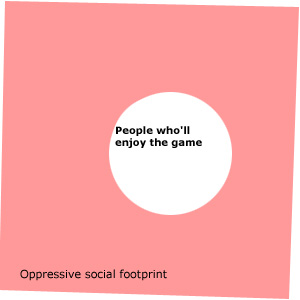
Plus we've got this:
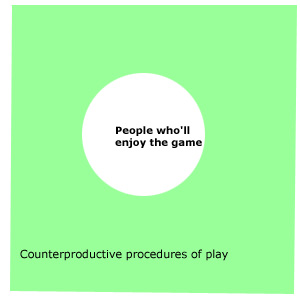
Plus we've got this:
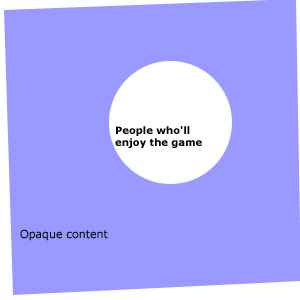
Put them all together and here's where we're at:
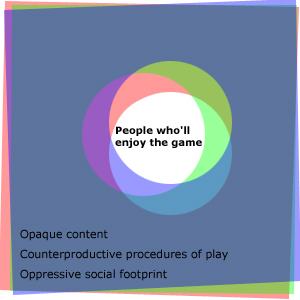
Now imagine that we've procured a license that has a lot of nongamer fans. Let's say that we get to make Downton Abbey the RPG.
Will the game succeed with its nongamer fans? Not if we do this, it won't:
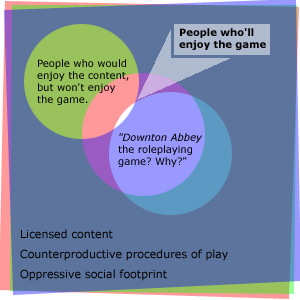
Somehow we've got to do this instead:
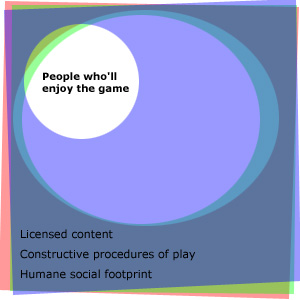
No matter how potentially broadly appealing a game's content might be, same thing. Will it reach nongamers? Not under these circumstances, it won't:
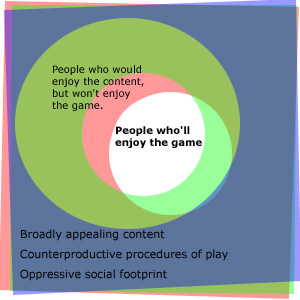
Somehow we've got to do this instead:
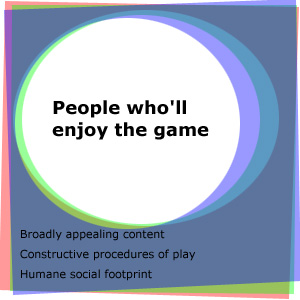
The End.
P.S. Of course, then we get this to deal with:
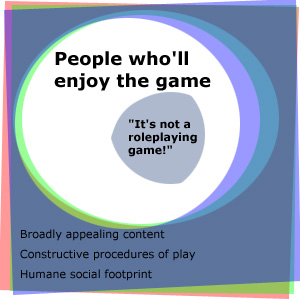
1. On 2012-02-12, Chris said:
Humane v oppressive?
2. On 2012-02-12, Vincent said:
Sure.
3. On 2012-02-12, Tyler Tinsley said:
I still think most of this stems from focusing on
Cloud -> Box
and not focusing on
Box -> Cloud
With a "Box > Cloud" focus you can meter content, procedure, and social foot print.
"Cloud -> box" means you have to reform content, rules, procedure based on whatever people come up with and that causes an oppressive social footprint because it then requires the audience to be good game designers.
Box -> cloud movement needs the be the meat, Cloud -> Box movement is the salt.
4. On 2012-02-12, Michael Wenman said:
Nice.
It's always easier to see logic when working with venn diagrams.
I've tried to explain similar things to other design focused folks here (in Australia), but in many cases they just didn't get what I was trying to say. Now I can just point them here.
Thanks.
5. On 2012-02-12, Ben Lehman said:
Tyler:
You are right and wrong simultaneously.
Right, in that you're correct, that's probably a useful thing to talk about, technically.
Wrong, in that, this is in no way something which is solvable by a single technical change to rules design.
6. On 2012-02-12, Tyler Tinsley said:
your right Ben, the reliance on books is also a problem :P
7. On 2012-02-12, Jay Loomis said:
So, feel free to point me to the thread where you've already done it, but could you define your variables? I get "counterproductive procedures of play", but what do you mean by "oppressive social footprint" and "opaque cotent" in this context?
8. On 2012-02-12, Ben Lehman said:
And what happened to the good old problem of microaudience?
9. On 2012-02-12, Ben Lehman said:
Jay:
So, I'm not Vincent, but I've had a lot of conversations with him on this topic, so...
Oppressive Social Footprint is the demands a game makes on the time, space, and logistics of its players. Polaris is a game with a highly oppressive social footprint, for example, because it requires exactly four people, for 3-4 hours at a time, and the same group of four people every time you play. That's rough, in terms of adult lives and scheduling. Another example is a "campaign game" where we're expected to play 4-6 hours a week, every week, for 4-10 years. That's simply not reasonable to ask most people with lives, sleep schedules, and jobs, let alone children and spouses.
Opaque Content is content which is alienating to a large chunk of the world. For instance, fantasy is not particularly opaque content, but a game which requires you to read several hundred pages of setting material is opaque content. Dogs in the Vineyard's consistent pitching problem has to do with its opaque content. "Play religious fanatics oppressing people? No thanks!"
All of my negative examples here are not to say that the games are in any way bad. These are obstacles to the game, not condemnations of it. If you can get past the oppressive social footprint of Polaris, it's a lovely game. If you can get past the opaque content of Dogs, you realize a richness that you never would have guessed.
yrs—
—Ben
10. On 2012-02-12, Paul Czege said:
Why are the oppressive social footprint, counterproductive procedures of play, and opaque content so entrenched in what we do? Do we need to know why to get to the ideal state?
11. On 2012-02-12, Chris Chinn said:
Why are the oppressive social footprint, counterproductive procedures of play, and opaque content so entrenched in what we do?
Look at the ideal of the "real roleplayer". Everything associated with the "real roleplayer" is one of those issues, twisted around into being considered a virtue*:
Long sessions? Dedication!
Difficult rules? Intelligence!
Complicated Setting? Creativity, Passion!
In fact, push the "real roleplayer" ideal so hard that even people who are generally willing to jump through the filters listed above, can't even honestly communicate about what they want between each other for functional play because part of being a "real roleplayer" is simply trying hard enough until fun magically descends upon the group by the Grace of God, regardless of social or procedural issues.
Those 3 problems came early in the hobby, but it was twisting them around into ideals that entrenched them:
http://bankuei.wordpress.com/2009/12/15/the-roots-of-the-big-problems/
*It's also easy to see why Vincent's PS is "Those aren't real roleplaying games" occupies that particular space, under this lens.
12. On 2012-02-12, Scott Slomiany said:
To be honest, you see the "it's not a real
" bubble across all game types. The largest and most obvious one right now being the facebook (and increasingly mobile) "social" games. Here you've got suddenly a huge swath of people who would never consider playing video games now investing time and money on their cities/farms/etc, and a large swath of the videogame fans deriding them as "not being games," because the paradigms these games use are not the standard rules that have been applied in the past.
13. On 2012-02-12, Russell Hoyle said:
I got lost once you introduced the Downton Abbey hypothetical; the diagrams are not as easy for me to follow (compared to the previous ones).
I dont understand what the cirles represent in figures #5 & #7
Rusty
14. On 2012-02-12, Larry said:
Good work!
15. On 2012-02-12, zornwil said:
I wish I understand purely visual presentations like this.
16. On 2012-02-12, Alex Abate Biral said:
Maybe this is a dumb question, but, going from Mr. Lehman's explanation of what the terms are, won't these games with broadly appealing content and humane social footprint be less fun or watered down? I mean, I can see how such games could be interesting. Murderous ghosts is a good example of a fun game that can be played quickly and with very little commitment.
But it seems to me that these don't really compete with "real" rpgs. Murderous ghosts is fine, but I will take an Apocalypse World session anytime over it. It seems to me that the "best" games will always be for a small set of people, even if you manage to move around what that set is.
17. On 2012-02-12, Jeff Russell said:
@Alex: while I personally agree that I would much rather play a years long campaign in a rich group created setting with complex but flavorful rules, that's because you and I are the people for whom current models of RPGs are already working. For any given one of the three colors above, we're in the white space of "people who would enjoy the game" on most RPGs. Not to speak for Vincent, but I think the idea with addressing these problems is to expand the potential design space of RPGs so that a) people who are not wired to enjoy all the intricacies of RPGs as we currently know them will want to play, and b) people like us who love roleplaying can do it more often with more people and still get the core of what makes it great without all the froofuraw and embellishments that some of us love so much.
Here's a sports metaphor, ironically enough: to play pro football you have to train for years, play successfully in a college program, get drafted, and practice constantly (pretty oppressive social footprint). You have to learn rules, plays, the strengths and weaknesses of the other teams, et cetera (narrow content). Oh, and also it's full contact, you have to wear pads, you might get injured, and you have to be abnormally big and strong to do well (difficult procedures). Now, to pro-football players, thay's "real football" and why would they play any other way? Well, maybe thanksgiving rolls around and they want to play a game with their friends and family. Or they want to teach their kids to play so that maybe one day they'll play "real football", but I'd not, at least they got to share in the enjoyment of something their dads loved.
18. On 2012-02-12, Jake Richmond said:
Alex, "best" is subjective. I'll take the broadly appealing content and humane social footprint game that I can play over the "real" rpg that no one wants to play with me any day. Or in other words, in a world where 99% of my friends and potential playmates have no interest in post-apocalyptic mayhem (no matter how great), showing up to the party with Apocalypse World won't do me any good.
While the best game experience may be the one most specifically tailored to what you want, finding players who actually are interested in your super small niche game isn't actually that easy. Yes, yes, you've never had trouble finding people to play an Apocalypse World game, but chances are you've never played it with your girl friend. Or your mother. Or your co-workers. Or maybe you have, but chances are that most people in your life, if you asked, would say that the material doesn't honestly appeal to them. Why? Because just like you, they have a "best" game, a niche interest. And Apoc World, as well as most other games, doesn't scratch it.
Lets looks at G X B for a moment. Are you familiar with it? It's a shoujo dating sim game for 4 or more players that you can play in about 60-90 minutes. It has almost no rules, and most of it's 16 pages of content are instructional manga that teaches players how to play the game. It uses a deck of cards. It's easy as cake to play, and you can teach it as you go. Once you've played it you can turn around and teach it to your friends. As far as a humane social footprint goes, it's pretty inclusive. As long as you have 4 people you can play, and the more people the better.The same amount of time to play as a short movie, and you don't need any special props or table clutter. Just a small book and a deck of cards. So it's super easy and accessible.
So that's nice... but you'd still rather play Apocalypse World, right? For you that's the better game experience. It's what you want, and what you want is the best. And that makes sense. Here's this though. Heather Aplington doesn't like post-apocalyptic sci-fi. Nether does Marah Richmond. Or Sophie Bidoof. These are young women in my life who would much, much rather play a shoujo manga game, or a romantic comedy game, than any kind of sci-fi game. Here's the neat thing. As a potential audience they outnumber you. They outnumber sci-fi fans by a margin that's so big it's ridiculous. More people will read a shoujo manga today than will read a sci-fi novel this month. More people will play a social dating sim game on their phone, or their console, or their computer, or facebook, than will play Fallout 3 this month. This audience is just as super specific as the one that prefers post-apocalyptic role play. It's preferences are just as narrow. There's just way, way more of these people. Their niche interest is just way, way bigger, more popular and more universal than yours. If offered a choice between a "real" rpg and something like G x B, they'll choose G x B every time.
So here's the thing. as a designer, and even more as a publisher, I'm way, way more interested in making games for this super huge, mostly untouched audience (and in fact have been for awhile, to degrees of success) than trying to make games for the traditional tiny existing rpg audience.
19. On 2012-02-12, Vincent said:
Russell: Do these help with graphs 5 and 7?
Licensed content:

Broadly appealing content:

20. On 2012-02-12, Vincent said:
Oh, and yes, I'm with Ben's explanation in every particular.
21. On 2012-02-12, Ewen Cluney said:
I don't know if I'm unusual among gamers or what, but I enjoy a diversity of experiences in my RPGs. There are certain things that bug me (I have an irrational dislike of exploding dice) and certain kinds of content I like or dislike (like anime magical girls, no interest in zombies), but I can go anywhere from a long D&D campaign to a one-shot of one of Jake's nifty games and have fun. People can and should play what they enjoy of course, but from the first time I saw the Forge booth at Gen Con SoCal way back when, I've known that RPGs can be just about anything, and that that's all kinds of awesome.
If we do come up with a role-playing game that can fit the busy lives of a typical adult Downton Abbey fan or similar (ask me about my manga-inspired slice of life schoolgirl RPG app project some time) it will likely be on the fringes of what we currently think of as an RPG. There are already tons of people doing free-form fanfic-like role-playing on message boards and whatnot, probably a lot more than are doing tabletop. I don't have any idea where all that would take us, but I think I want to see it.
Also, I really, really don't buy the "not a real X" type arguments some people throw around. There are edge cases where you can make a rational argument (you could make a strong argument that Action Castle isn't an RPG for example), but by and large "this isn't a real RPG" really seems to just mean "this isn't the kind of RPG I prefer." In video games there's a lot of complaining about social games. Those kinds of games do get incredibly cynical in many cases (and I've heard some terrible stuff about Zynga in general), but saying that they're not games requires moving away from how actual people use the game in real life.
22. On 2012-02-12, Alex Abate Biral said:
@Jeff Russell, @Jake Richmond
Thanks for the replies, and I am really sorry if I appeared confrontational in my post. The question I asked is real. I actually don't know whether making your game reach a broader audience really involves.
On one hand, there is what I said about AW and Murderous Ghosts. In fact, I don't need to look far to see a game that isn't "for me", Poison'd fills those shoes very well. And I really appreciate Poison'd. Even though it is a game I probably won't ever play, I can see why (or at least part of it) Vincent is so proud of that game. So that seems to support the idea games that more "powerful" games are less "appealing".
On the other hand, though, removing counterproductive procedures of play, if I understand the term right, didn't make games more "watered down". If anything, it did the opposite. It helped games focus on what is awesome about them.
So, that is what I am wondering about, if making games that reach out for a bigger number of people really implies making games that are "shallower". I also wonder about a few other related things. For example, if that relation is true, wouldn't people outside the small white spot wouldn't prefer games with similarly small white spots homed at them, instead of all inclusive games. And would games that are even "deeper" necessarily be more niche?
23. On 2012-02-12, Vincent said:
Alex: Excellent questions.
24. On 2012-02-13, Vincent said:
Over on G+, Marco proposes "this game is hard to get together" instead of "this game has an oppressive social contract." I like it.
25. On 2012-02-13, Paul Czege said:
If you solve counter-productive procedures of play, does it compensate for non-broadly appealing content? A lot of folks design as if it does. But does it?
26. On 2012-02-13, Ben Lehman said:
Paul: That gets you the particular little green sliver of audience.
yrs—
—Ben
27. On 2012-02-13, Alex Abate Biral said:
@Vincent
Thanks! Hopefully, working on these 3 problems you delineate will help answer them. I noticed I finished my second paragraph mid-sentence. But it seems like I still got my meaning across, so all is well.
@Jake Richmond
After re-reading what I wrote earlier, I realized I expressed myself very badly. I didn't mean at all to say games with a wider appeal are inferior. I was using "best" to indicate persona preference, not some objective way to measure a game's worth. I never played G X B either, but if I ever have the opportunity, I will be sure to give it a try.
Also, I kind of did Murderous Ghost a disservice. It is implied that if I could play AW all the time, I would never make room for Murderous Ghosts. That is not what I meant to say either.
28. On 2012-02-13, stefoid said:
The Wii is not a real game console?
29. On 2012-02-13, Roger said:
I would humbly suggest that these problems are not fundamentally design problems, as such.
Practically speaking, they're essentially marketing problems.
30. On 2012-02-14, Vincent said:
Roger: At first blush, I think the opposite so hard that I can't even blink.
So, say more. Really?
31. On 2012-02-14, Ben Lehman said:
Marketing problems are design problems.
Also, design problems are marketing problems.
This is not to say that they're identical, merely that every marketing problem contains, within it, a design problem, and every design problem is, viewed at the right angle, a marketing problem.
yrs—
—Ben
32. On 2012-02-14, Vincent said:
I agree with that, it's the "fundamentally" and "essentially" that has me unbeblinked.
33. On 2012-02-14, Moreno said:
About the Social Footprint.
I think that past experiences show that it's not the "smaller" footprint that get the most people, but the RIGHT footprint: n the sense of "this footprint is making me do things that I wanted to do but I couldn't"
D&D got really, really big with an audience of kids with little social skills, because (among other things) it forced them to meet, to enter in a "group". For that audience it was not a problem, it was, I think, the bigger perceived benefit (the problem was that wasn't the right game to build better relationship, but let's not dwell on that)
I north Europe, "laiv" (live) games are really huge, with a lot, really a lot of players. And the social footprint is huge, too: travel, costumes, day-long or longer games, etc.
It's true that a game that you can play with anybody everywhere (smaller footprint) is easier to play at any moment... but for this same reason.. WHY play it NOW? There is always something good on TV, something to see in a DVD, some e-mail to write, something more urgent, something that you should do right now. The game can wait. You can play it every time you want. In the next days.
Or am I misunderstanding what you meant with "social footprint"?
34. On 2012-02-14, Vincent said:
You're understanding. Good point.
35. On 2012-02-14, Roger said:
Alright, I'll unpack what I'm talking about here. I may have been a bit... overzealous in my original assertion.
What I'm trying to say is that issues like "hard to get together", "opaque content", etc, are issues insofar as people think of a game in those terms. It doesn't really matter whether a game is actually "hard to get together". It matters whether people perceive the game in that light.
Because if you can get people past those perceptions and into actually playing the game, a lot of these problems tend to become self-correcting. The game is easier to get together the more you play it and the more other people play it. The game becomes less opaque the more you play it. Etc.
I am psychically sensing you are not yet in agreement with me, so I'll offer you this thought experiment:
Consider these issues of opaque content, social footprint, and procedures and protocols, as a tabula rasa outsider, of the following popular constructs:
* Catholicism
* Amateur sports of all sorts
* Courtship
* Marriage
* Childbirth
* Work
I would suggest that even the average RPG is way ahead of these in terms of raw design. Hence I'm inclined to think it's not actually a design issue, nor something that a sufficiently-clever monkey can design his way out of.
36. On 2012-02-14, Vincent said:
That's pretty nuts!
The difference between Apocalypse World's social requirements (3-5 players, 2-4 hours per session, with a 6+ session commitment) and Murderous Ghosts' (2 players, 20-60 minutes, no further commitment) is a difference in their designs, right? Same with Apocalypse World's 300-page MC book vs Murderous Ghost's 32-page MC book. Same with Apocalypse World's relatively more obscure content (although Dogs in the Vineyard clearly beats both of them here).
I propose that Apocalypse World will be, because of these design differences, harder to market to a general audience than Murderous Ghosts will be. I might be wrong! But that's my proposal.
And, but, well. Give me the promotional budget that marriage has had over the millenia, and I'll rock the world.
37. On 2012-02-14, Roger said:
I propose that Apocalypse World will be, because of these design differences, harder to market to a general audience than Murderous Ghosts will be.
Okay, I think we're in agreement.
Of course, we end up running into the classic problem of the artist: in the course of producing my artistic vision, should I concern myself with my audience?
Heck if I know. This is still a useful way to talk about the thing, so I thank you for that.
38. On 2012-02-14, Vincent said:
Cool!
I think that part of the motivation for making, say, a Buffy the Vampire Slayer RPG has got to be to reach Buffy fans who aren't already roleplayers. Or maybe not! You're right, heck if I know too.
39. On 2012-02-15, Jaywalt said:
Yeah, what I increasingly take away from these conversations is: many people who say they're making games to reach a wide audience do not know what they're talking about or maybe even how to do that. Maybe they don't even actually want to do that (I think that latter point is pretty likely, it fact).
It's totally fine to make a game for a single person, or a group of people, or a community of people, or for a huge mass of people. But targeting specific audiences makes the kinds of design work you do completely different.
Sometimes it does violence to your game when you attempt to alter it to reach an audience it was not originally meant for. But other times it opens it up to other possibilities of what it can be or how it can play.
40. On 2012-02-15, Simon C said:
While I agree with the broad points here, my experience of "opaque content" has mirrored Moreno's points about social footprint.
When I describe some games I like to people who aren't familiar with games, they respond better to detailed, unusual, and compelling material like Dogs, Bliss Stage, and so on, to broader, less specific, more familiar material (Apocalypse World, for example).
So, I guess what I'm saying is that I agree with the problems as you've stated them, but not with the (implied) solutions.
41. On 2012-02-15, Vincent said:
Oh, no, less specific content is definitely not what I'm recommending. Specific content has shown itself to be more appealing over and over again.
42. On 2012-02-15, Deliverator said:
Regarding comments #25 and #26: Holy crap! I am the green sliver!
And I suspect I'm not completely alone; in fact I'd argue that the audience for certain indie games is basically defined by that green sliver. Particularly Burning Wheel?doesn't suffer from counterproductive procedures of play, but hard to get together (for the implied "long campaign") and pretty nerd-tacular content.
(Note: the procedures of BW play can certainly be complex, but they're not counterproductive.)
Matt
43. On 2012-02-15, Troy_Costisick said:
Vincent,
Isn't something like "How to Host a Murder" by Decipher and "Murder Mystery Party" by University Games the sort of thing represented in figure 8? Social footprint isn't big, content isn't opaque (especially since there's lots of choices for themes), and the procedures aren't counter-productive IMHO. Seems exactly like what you're talking about.
Peace,
-Troy
44. On 2012-02-16, Roger said:
On a more technical note, it might be worth noticing that, for most games, there are actually two constructs: one for the GM and one for the players. Lots of games do pretty well on one side and then totally mess up the other.
45. On 2012-02-16, Jay Loomis said:
Perhaps this is just a restatement of others' comments, but these images seem to imply that there is a universal sweet spot. Having followed your design discussions for many years, I think that must mean that I don't fully understand. Are the colored squares delineated by a specific target audience (determined as a conscious design decision), rather than all people who might play games?
46. On 2012-02-17, Frank T said:
Hi Vincent, I don't know if this is a productive comment but I'm not buying your assumptions. Sure, there is the social footprint and the opaque content and the counterproductive procedures, I see that. But the equation of "elimate these factors and you have a game that appeals to a very broad audience" is something I know is a very popular idea among the Forge diaspora, I'm just not buying it.
It takes a very particular set of interests to get into role-playing. Not anybody who likes to play a board game now and then and likes to read fiction now and then is only waiting to become a role-player once a sufficiently "accessible" and "appealing" product comes along.
Well, maybe I'm just the "it's not an RPG" guy in your P.S...
47. On 2012-02-17, Josh W said:
I love niche, weird, particular content, that a few people will love.
So much better than stuff that hits for a mass market by replaying everyone's cultural preconceptions and stereotypes.
I want to speak to those experiences of people that are depreciated and unnamed by the standard media machine-defaults.
But how to make that without it being opaque? How to lead people in smoothly? So people get to share a game that's personal to them with friends to whom it's not so personal? That's a problem I can get behind.
48. On 2012-02-17, Paul Czege said:
Bacchanal hardly ever gets played. I don't think it's because the mechanical procedures aren't constructive. I don't think it's because it demands too much time, or because people can't figure out how to construct or afford a workable set of dice. I think it's because telling sexy stories to your friends is awkward, so people shy away from it.
So, is the solution to make the content of play less awkward? I don't think it is. I think the solution is to create a bigger, more compelling payoff for players who don't shy from playing the game. Make the content more compelling, not less awkward. Make the procedures of play more constructive, more productive.
49. On 2012-02-17, Vincent said:
I agree!
50. On 2012-02-18, Ian Charvill said:
Just to check my understanding:
Do some design issues perform double-duty. For example, complexity. Complexity will increase the teaching time for the game, so it's affecting how hard a game is to get together, i.e. social footprint. It is also going to affect how productive the procedures of play are: most people have a limit to how many steps they'll go through in a process to get their desired result.
So, further example, Mouseguard is sitting on my shelf and its never going to get played. Learning it versus the other play options I have: I'm never going to make that choice, there are other games I can learn and teach so much more quickly. Furthermore, in play we're going to drop a lot of those rules in any case, or stop playing because it's too complex. The complexity will get in the way of our fun.
(I suspect if the fictional content were more compelling, to me personally, I'd be more willing to give it a try).
What I'm checking is that these three variables are inately interconnected, not three independent dials.
51. On 2012-02-19, David Berg said:
I think there can be a tension between "deliver what I currently like about RPGs" and "minimize social footprint". For example, the more convenient you make playing, the less you give an audience the "campaign experience" of an epic arc with well-known characters who everyone's deeply invested in.
On the other hand, if your favorite RPG is Fiasco, not a problem.
Actually, doesn't Fiasco solve these 3 problems? It's a quick one-shot, the rules work, and it's about a genre that is popular without being over-done. The main audience limit I see is the game's creative demands.
52. On 2012-02-19, Vincent said:
Ian: Yes! Check.
53. On 2012-02-19, Vincent said:
To see burdensome, oppressive, or otherwise just offputting social footprints, don't look at the games you play, look at the games you won't play. Look at the games you'd like to play but can't get your friends to play with you.
Same with counterproductive procedures of play. Don't look at the games you enjoy playing, look at the ones that aren't really that much fun.
If you've designed a game, and it's reaching the people you hoped it would reach, hooray! You nailed the content, the social footprint, and the procedures of play - they align right around your audience's needs and interests. There's no reason for you to read this at all.
If, however, you hoped your game would reach some certain people, and you've managed to put it in front of them but they haven't responded to it after all, that's when to look at these things. You've misjudged the content they're interested in or the social obligations their lives can accommodate, or else your game is making promises that its rules don't keep.
Most of the people in my life would never, ever play Apocalypse World. Why not? For very good reasons. If I want to design a game that I can play with them, I have to take those reasons seriously and figure out how to design a game that they would play.
54. On 2012-02-20, David Berg said:
Ah! Now I am properly oriented for this discussion. Thanks. That makes perfect sense to me.
These 3 problems are about reaching one's goals, with "reach non-RPGers!" merely being an example goal.
If I'm making a 100-hr game for people who like 100-hr games, my game's social footprint isn't a problem. I just need to be realistic about the size of my audience.
Personally, whenever I'm tempted to try making a game that the people in my life would play, "you don't have to make up too much stuff" seems to be a prime requisite, which tends to lead me away from RPGs. I'm not claiming "RPG for non-RPGers" is impossible, but designing a party game or board game strikes me as an easier way to reach that audience.
I do think it's interesting to look at what kinds of roleplay most people find least demanding, though. It seems to me that "control one character, respond to situations by picking between discreet options, portrayal optional" tends to be pretty accessible.
55. On 2012-02-21, Paul T. said:
Pretty accessible? Perhaps.
But the requirement of a skilled "GM" who has made efforts to prepare for play (learning rules, maybe printing character sheets and buying dice, preparing scenarios, statting up monsters, etc) makes its own barrier.
Most "RPG clubs" I've had experience with lament the dire lack and availability of "GMs", like it's a rare sort of creature who is desperately needed by the community. If your game needs a skilled facilitator in order for people to begin playing, that's a significant barrier to entry for most.
56. On 2012-02-21, Vincent said:
I am SO HAPPY with how easy and fun Murderous Ghosts is to GM.
57. On 2012-02-22, Simon C said:
I was thinking recently about how you can probably get away with a game that's difficult to master and/or has complex processes, so long as that difficulty is shared and overcoming it is a collaborative process.
Being the GM of a difficult game sucks when the players are waiting for you to bring the fun and you're stuck figuring out how to do it right. But if the game has complex processes (or better, processes whose application is more art than science) and figuring out the best ways to use those processes is a conversation that can be shared around the table, I bet that is way more fun. Maybe not as fun as a game that's easy from the get-go, but maybe more likely to foster loyalty once you've got it.
58. On 2012-03-20, Chris Mitchell said:
Hey, resurrection!
So, as Murderous Ghost has a more humane social footprint, more broadly appealing content, and fairly constructive procedures of play.
Do you think it will out-sell Apocalypse World? Because I don't.
I think you're missing the fourth thing, which is "is it a role playing game, with all the baggage that has attached to it?"
In other words, I think "people who will enjoy the game" in no way means "people who would ever actually consider playing the game for 30 seconds". I think that's a bigger battle.
RSS feed: new comments to this thread
This thread is closed to new comments.
home: anyway.
newer thread: 2012-02-19 : Holy Crap Monsterhearts
older thread: 2012-02-03 : Murderous Ghosts



















